Stephen Hawking’s 8 Rules for Success
 ClickHelp Teamin TechComm Career Path on 3/15/2018 — 4 minute read
ClickHelp Teamin TechComm Career Path on 3/15/2018 — 4 minute read ClickHelp Teamin TechComm Career Path on 3/15/2018 — 4 minute read
ClickHelp Teamin TechComm Career Path on 3/15/2018 — 4 minute read

Stephen Hawking is one of the greatest physicists of the 20th century, who passed away 14 March 2018. Among other physicists, he was more renowned for the singularity theorems, which brought him worldwide success. In the recent PBS documentary he commented upon it: “Sometimes I wonder if I’m as famous for my wheelchair and disabilities as I am for my discoveries”. Despite his disease, he received widespread acclaim from the scientific community for his contribution to the world science. Let’s see what lessons we can learn from the extraordinary personality of Stephen Hawking.
Stephen William Hawking was born on January 08, 1942 in Oxford, England in a family of well-educated people. He began his higher education at University College, Oxford at the age of 17. Against his father’s wishes, he wanted to pursue Maths as his major, but it was not taught as a subject in Oxford University at that time, so he had to take Physics and Chemistry instead. At the age of 21, he got a first-class BA (Hons.) degree in Natural Sciences.

The next year young scientist was diagnosed with amyotrophic lateral sclerosis (ALS). Doctors said that he had two years to live. Fortunately, his disease was progressing very slowly, so he could continue working.
Stephen Hawking died at the age of 76. His bright personality continues to inspire many people around the globe. Let’s see what life principles did Stephen Hawking follow.
1. He used technology overcome his disability
Stephen Hawking always said that modern technology has a great impact on our lives and allows us to make great discoveries. As long as the greatest scientist himself was unable to speak, he used speech synthesizer.
Many scientific institutions offered him to make his voice sound more “human-like”, but the scientist refused: “The voice I use is a very old hardware speech synthesizer made in 1986. I keep it because I have not heard a voice I like better and because I have identified with it.”
2. He didn’t allow obstacles to distract him
Hawking always said that disability isn’t the obstacle to your dream and goals. After being diagnosed, he fell in love with Jane Wilde, they got married and had three children. And at this time he worked hard on research.

3. He was curious by nature
In the 2015 interview with WIRED magazine Stephen Hawking said that he felt like a child who had never grown up and kept asking “how” and “why” questions.
4. He had a good sense of humor

Stephen Hawking was involved in such series as “The Simpsons”, “Futurama”, “Stargate: Atlantis”, “Star Trek” and “The Big Bang Theory“.
5. He stuck to his principles

In 2008, Hawking revealed that he had been approached with the offer of a knighthood in the late 1990s, but he declined. This was apparently over the UK government’s handling of science funding.
6. He never gave up

When Hawking published his book about black holes named “Black Holes and Baby Universes and Other Essays”, his views puzzled the scientists of the 20th century. However, he continued working despite criticism and became one of the greatest scientific figures. Such commitment should serve as an example for those, who don’t feel strong enough to move toward their goals.
7. He valued time as a precious resource
Unfortunately, none of us is able to turn back the clock. So we should take an example from Stephen Hawking, who used his time wisely and made lots of great discoveries in his life.
8. He shared his knowledge
Hawking firmly believed that knowledge should be accessible. He wanted his works to be understandable for everyone. His dream came true when he published “A Brief History of Time” written for nonspecialist readers with no prior knowledge of scientific theories.

You might think that only hardship leads to success, but it’s not true. Stephen Hawking believed, that each and every one of us is unique and gifted with a power of the human spirit.
Good Luck!
ClickHelp Team
Author, host and deliver documentation across platforms and devices
Get monthly digest on technical writing, UX and web design, overviews of useful free resources and much more.
"*" indicates required fields